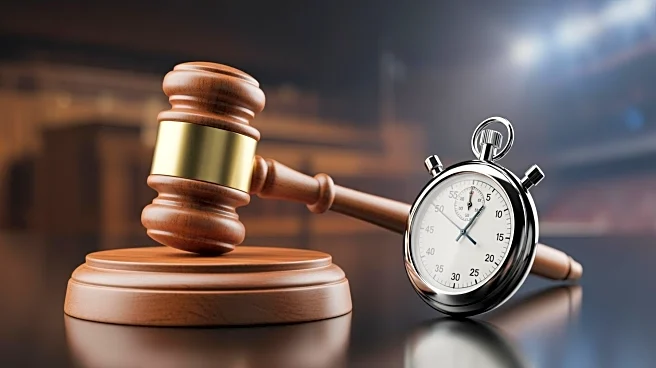What's Happening?
The Chief Justice of Nigeria (CJN), Kudirat Kekere-Ekun, emphasized the importance of the annual Judiciary Sports Competition in enhancing the judiciary workforce's effectiveness. During the opening ceremony
of the 31st edition of the competition in Uyo township stadium, she highlighted how the event strengthens bonds among staff, boosts morale, and contributes to a healthier and more cohesive judicial workforce. Represented by Uchechukwu Onyemenam, the presiding justice of the Calabar Division of the Court of Appeal, Kekere-Ekun noted that sports play a vital role in nurturing collective wellbeing, promoting camaraderie, discipline, strategic thinking, and healthy competition. The competition, organized by the National Sports Association for the Judiciary (NASAJ), features 13 events, including athletics, swimming, and chess, with participants from judiciary bodies nationwide.
Why It's Important?
The Judiciary Sports Competition serves as a crucial tool for fostering unity and wellbeing within the judicial workforce. By promoting values such as teamwork, resilience, and integrity, the event helps shape the atmosphere in which justice is administered, thereby influencing public confidence in the judiciary. The competition not only provides recreation but also reflects the values that underpin institutional life, contributing to a more effective justice system. The involvement of judiciary members from various departments and backgrounds in sports activities enhances mutual encouragement and shared purpose, which are essential for maintaining a robust and committed workforce.
What's Next?
The 10-day sporting event will continue to feature various competitions, with the Court of Appeal aiming to defend their championship title. The ongoing participation and support from judiciary members and state officials, such as Governor Umo Eno of Akwa Ibom State, are expected to further strengthen the judiciary's commitment to fostering wellbeing and unity. The competition's success may encourage similar initiatives in other sectors, promoting the integration of sports and wellness activities into professional environments.
Beyond the Headlines
The Judiciary Sports Competition highlights the broader cultural shift towards recognizing the importance of physical and mental wellbeing in professional settings. By integrating sports into the judiciary's annual activities, the event underscores the need for a balanced approach to work and health, which can lead to improved job performance and satisfaction. This initiative may inspire other sectors to adopt similar practices, contributing to a healthier and more productive workforce across various industries.










